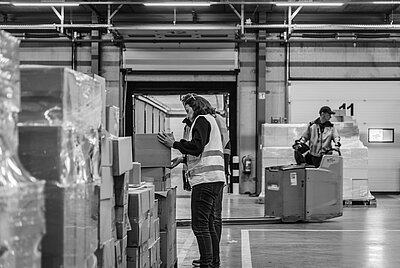Reconsider the role of the receipt
The humble receipt is having a much larger environmental impact than you might think on your store’s green credentials. In the UK, around 11.2 billion receipts are printed each year that aren’t recyclable thanks to the coating on the paper. In France, the average hypermarket uses roughly 10,600 rolls of thermal paper for receipts every year – with most heading straight to landfill.
But as of the 1st January 2023, France is banning paper receipts in-store. Customers will still be able to get a paper copy if they request one, but the move hopes to drastically reduce the number of receipts contributing to waste. In the UK and the Netherlands, stores are no longer obliged to give a paper or e-receipt but many still choose to.
While an outright ban on paper receipts might be too much of a transition for your stores to make, you could consider switching to recycled receipt paper and ensuring that it is recyclable to your customers.
You’ll be helping to save millions of trees each year and giving yourself time to establish a solid e-receipt system should you want to. It also gives you a great sustainability fact to shout about with your customers.
In-store swaps
Paying close attention to the materials you’re using in-store could help persuade consumers to make a switch to your brand. The 2022 UK Brand Sustainability Benchmark Report shows that 1 in 4 consumers has already switched brands because of sustainability credentials.
And making favourable changes doesn’t have to be difficult. You might find that you’re overlooking areas where you can make sustainable swaps with ease.
Last year we wrote about our 100% recyclable mannequins. They’re made from paper, which means recycling them is easy and simple – with no need to find a specialist recycling centre like you do with fibreglass mannequins. We have also introduced a range of sustainable clothes hangers, made from grass, recycled and biodegradable plastic. They’re CO2 neutral and give you an easy sustainability win for your store.
Of course, there are plenty of other simple swaps you can make in-store to have a positive impact on your carbon footprint. Choosing between paper and plastic bags, changing to eco-friendly cleaning products or switching packaging could all bring benefits to your in-store experience and your sustainability pulling power for consumers.
Keep an eye on energy consumption
Winter is always a tricky time for stores to keep their energy consumption down, it’s cold and dark, but with the planet heating up it’s also a challenge in hotter summers to keep stores cool without churning through electricity for air conditioning systems. You need to take a year-round look at reducing energy consumption to ensure you’re doing all you can to keep it green.
Stores with lots of glass windows let in a great amount of natural light which is great for reducing lighting costs, but it pays to make sure that the windows are of good enough quality that they won’t be leaking heat in winter (increasing your heating output) or turning it into a greenhouse in the summer, causing your air conditioning use to skyrocket.
In addition to this, installing a programmable thermostat means that you can adjust the temperature in-store to suit occupancy levels and opening and closing hours. This will reduce any unnecessary energy consumption.
If your store relies on lots of lighting, then switching to LED lightbulbs will reduce your energy consumption and your energy costs. How much you’ll save is dependent on your store but carrying out an energy audit is a great place to start to see what difference it could make. And that’s something that Worldpack can help with.
If you want to go one step further, you could follow in the footsteps of Swedish retail giant, IKEA, which has 935,000 solar panels on the roofs of its stores, among other green energy producing incentives, which covers its energy consumption. Installing solar panels could be a great way to show your commitment to sustainability to your eco-conscious consumers.
What will your in-store sustainability focus look like in 2023?
Our team of experts can help you strive for a greener in-store experience - speak to us on +31 (0) 88 494 20 80 or email us at online@worldpack.eu


